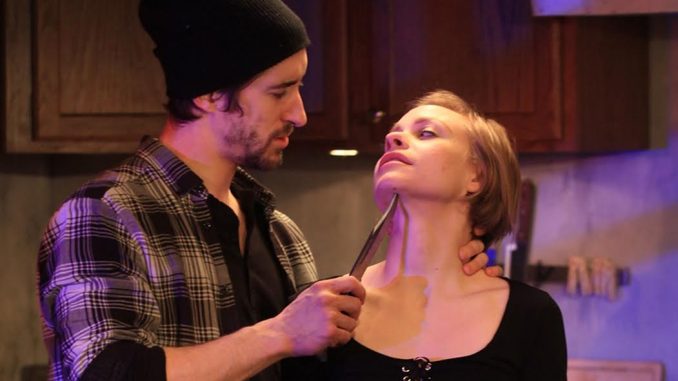
When actor Matteo Scammell first read the script for Kim Davies’ play “Smoke,” he wasn’t sure what to think.
“I finished reading the script on my computer and I just sat there like, ‘Woah,’” Scammell said. “I thought, ‘Can this be done? Should this be done? Can I do it? Should I do this? How would we even do this?’”
But Scammell—and Theatre Exile—took the piece on, and it premiered in Philadelphia. The play features two characters whose relationship goes from playful flirting to knives and violence, as the struggle for power leaves both people questioning their true desires.
Producing artistic director Deborah Block, a 2002 theater MFA alumna, knew the play had contemporary themes that would bring controversial topics to light.
“I was attracted to the script not just because it was a taboo subject, but because it was well-written and addressed the issue in an unusually nuanced way,” Block said. “It is rare to find plays that leave so much for the audience to decide at the end. We also wanted a play with a small cast that would work in an intimate space that would draw the audience into the action.”
That small cast is Julie, played by Merci Lyons-Cox, a 2013 theater alumnus, and John, portrayed by Scammell, 26.
Julie is a 20-year-old at her first kink party in Harlem, New York. John plays her opposite as an experienced 31-year-old “wannabe” artist who interns for Julie’s famous father.
“I don’t think Julie knows what she wants,” Lyons-Cox said. “But I think she gets it in the end. And getting what you want doesn’t always mean that it’s going to be positive.”
Even the audience was left to ponder the open-ended questions Davies left at the end of the play.
“I think the answer is layered, and it’s about peeling away the reasons [the characters] do what they do, which reveals a lot,” she added.
At a talk-back event on March 11, Davies said “Smoke” was based on August Strindberg’s “Miss Julie,” which takes place in Sweden in 1888. The story is about a romance between a baron’s 25-year-old daughter and his older valet, but the relationship ultimately leaves Miss Julie broken.
“[‘Smoke’] was an experiment of how ‘Miss Julie’ might play out in today’s society,” Davies said.
Davies’ original intentions for the play began to take shape when she started working with victims of sexual abuse in New York City’s BDSM community. BDSM is an acronym for “bondage and discipline, “dominance and submission” and “sadism and masochism.”
“I was involved in anti-rape activism against sexual assault and ended up working with people who were fighting back against the abuses within their subcultures [in BDSM],” Davies said.
In the BDSM community, there are rules and roles already in place, so all of the participants can have a safe experience.
In “Smoke,” the line between consent and abuse becomes blurred.
“The message is important because people get hurt,” Lyons-Cox said. “People have gotten and are still getting hurt.”
One of the challenges the actors faced was trying to clarify their character’s intentions with what they truly wanted from each other.
“When you’re 20 years old, you’re not an adult yet,” Lyons-Cox said. “You’re just not. Julie mimics John’s adult behavior to keep up with him. She doesn’t know the rules and he was breaking them. I’ve been a 20-year-old girl and I know what that’s like.”
Although the play has a strong BDSM connection, Block’s focus is less on passing judgment or blame and more on examining how and why things go awry.
“It’s not about the BDSM community,” she said. “It is about how things go wrong. It shouldn’t be an indictment of the community … it absolutely has to be the audience to be the next person to have the conversation.”
Katelyn Evans can be reached at katelyn.evans@temple.edu.


Be the first to comment